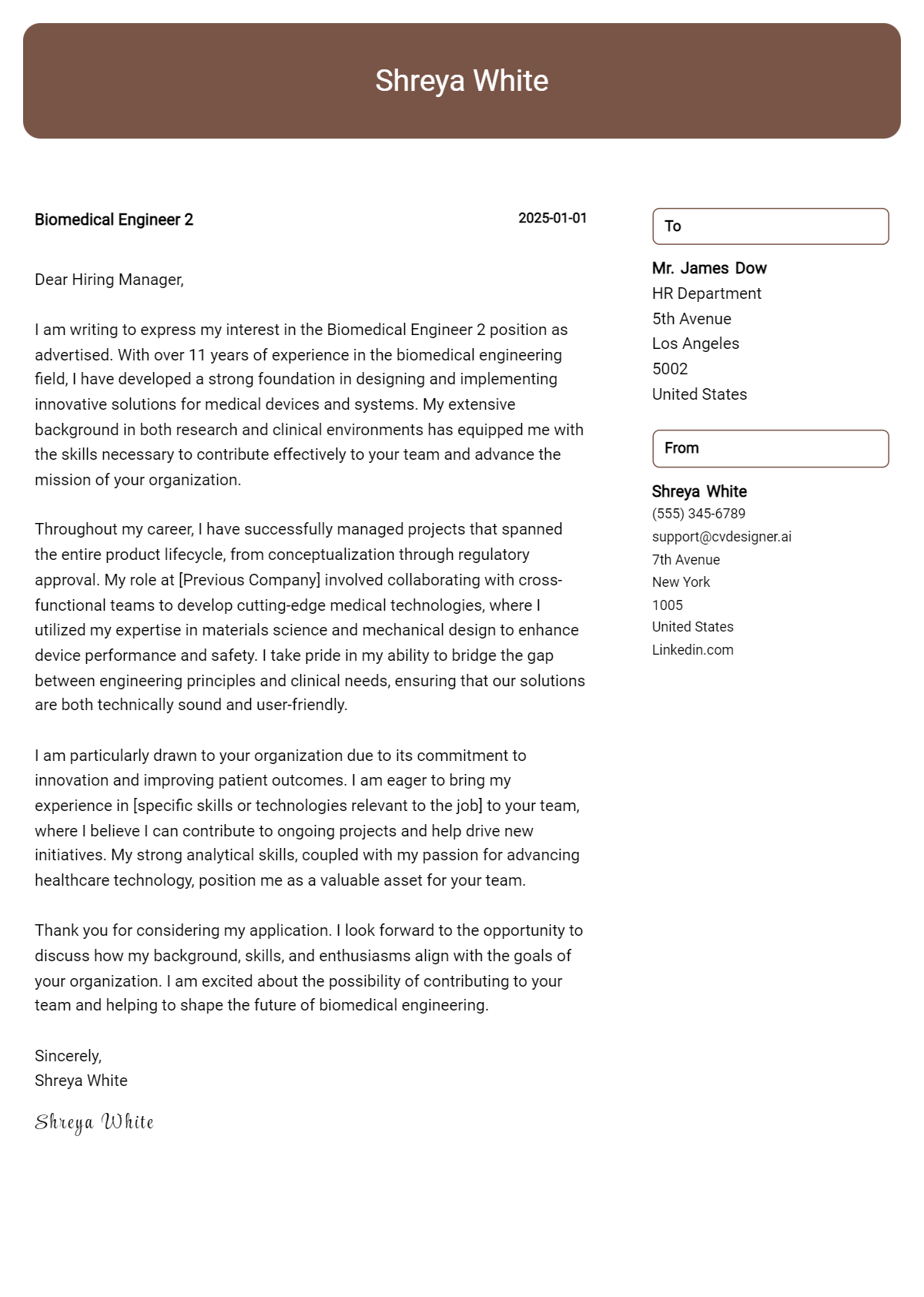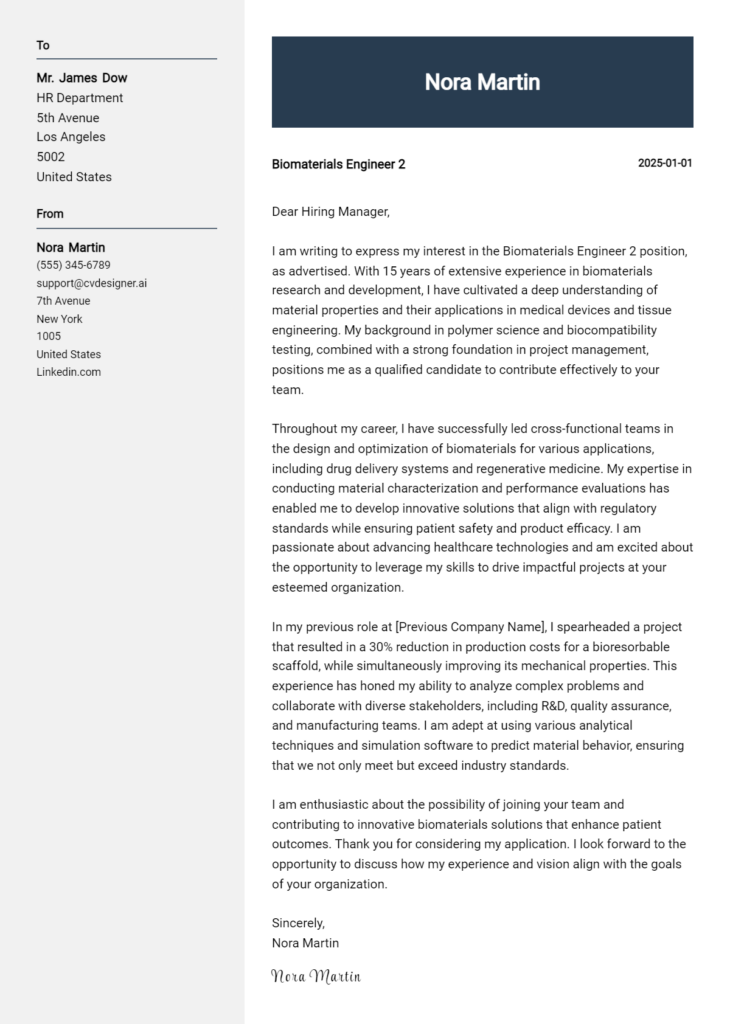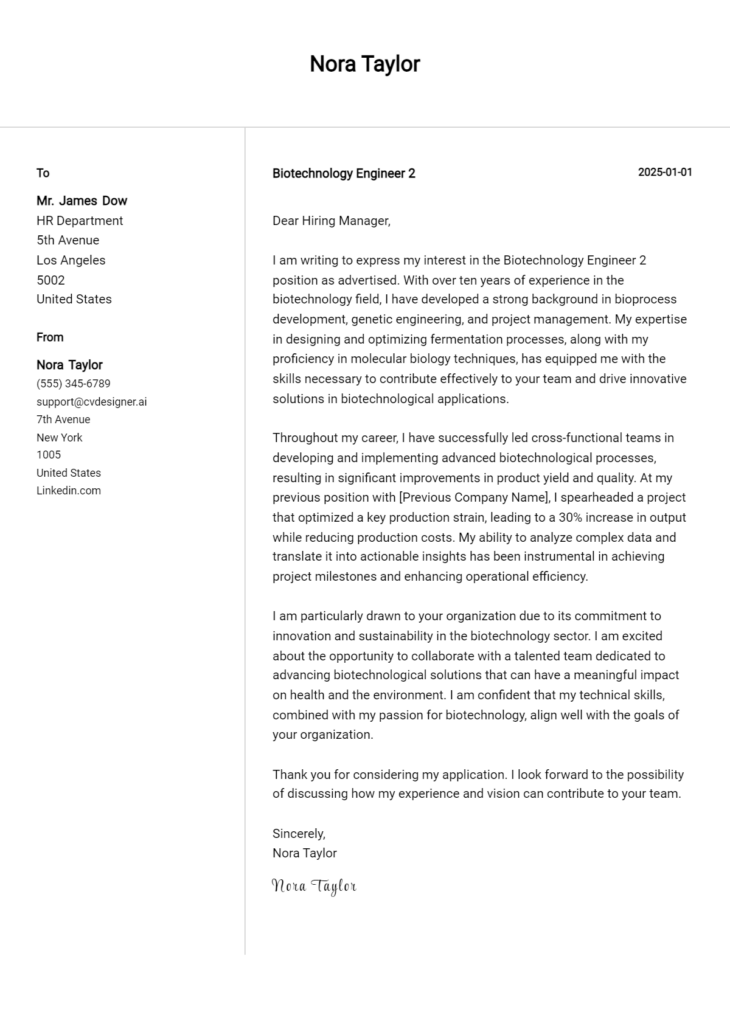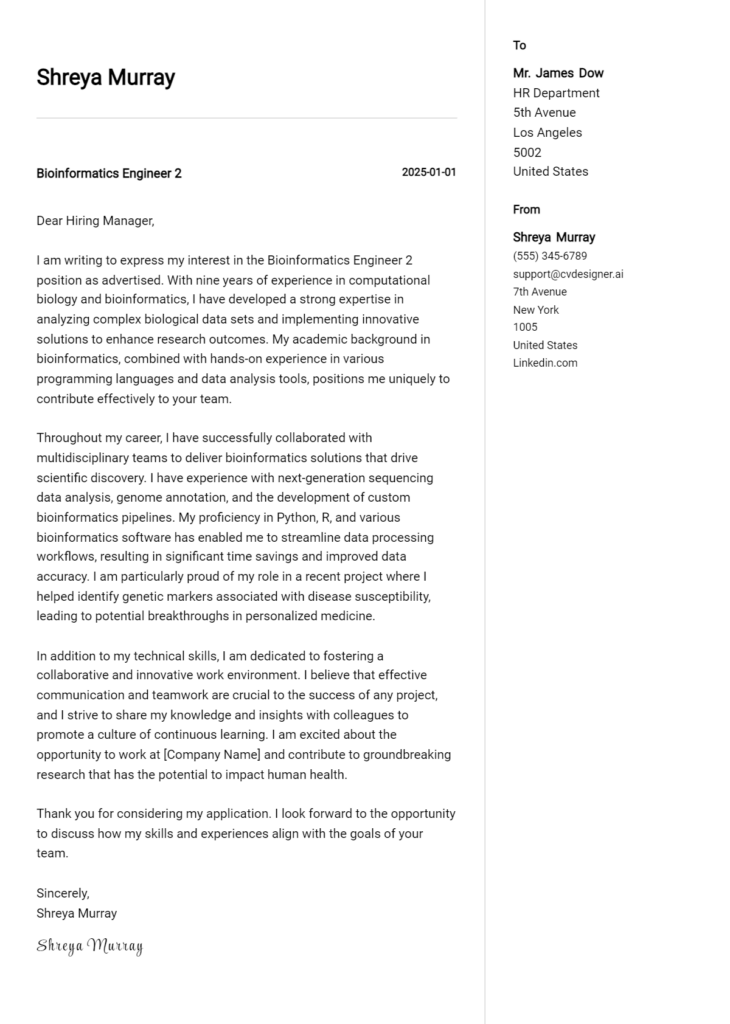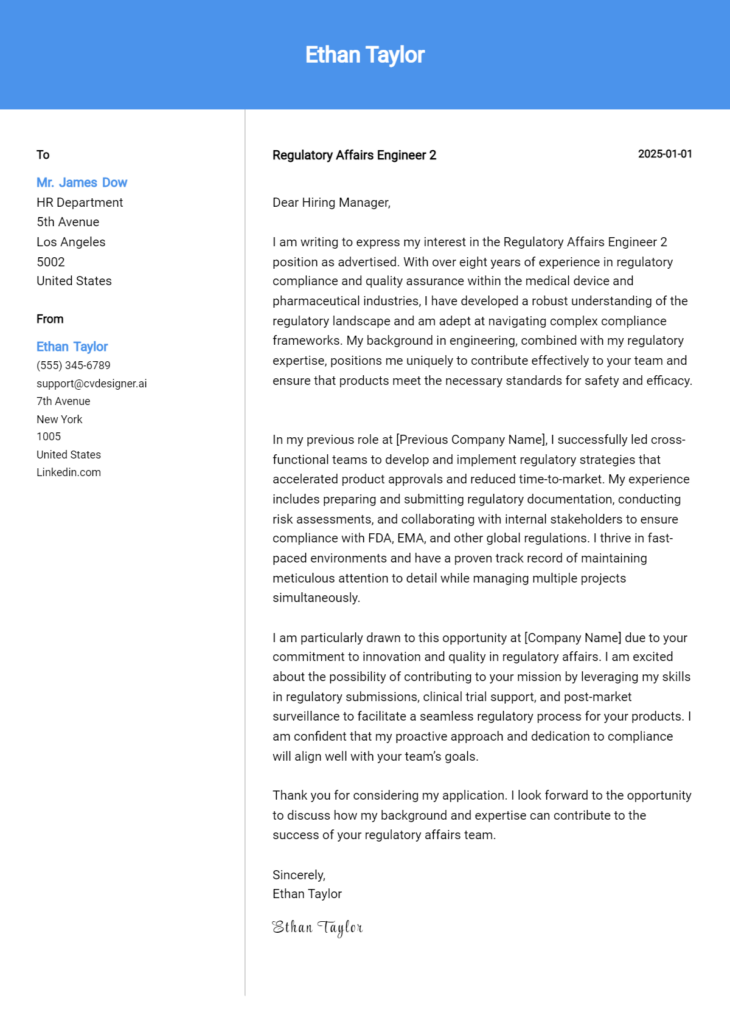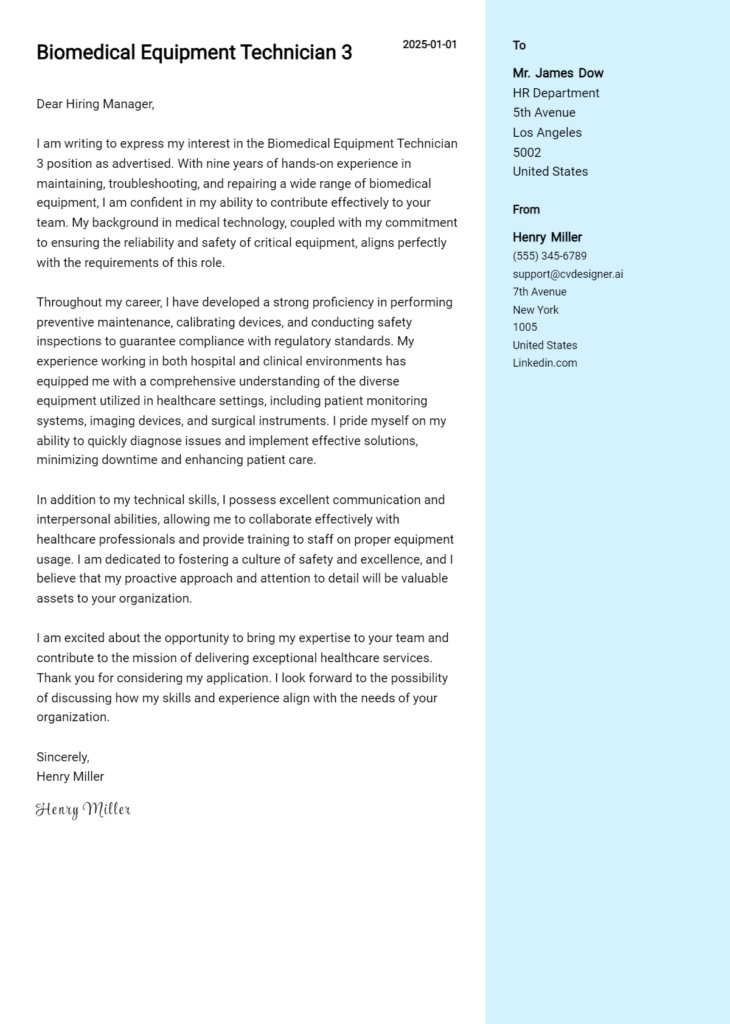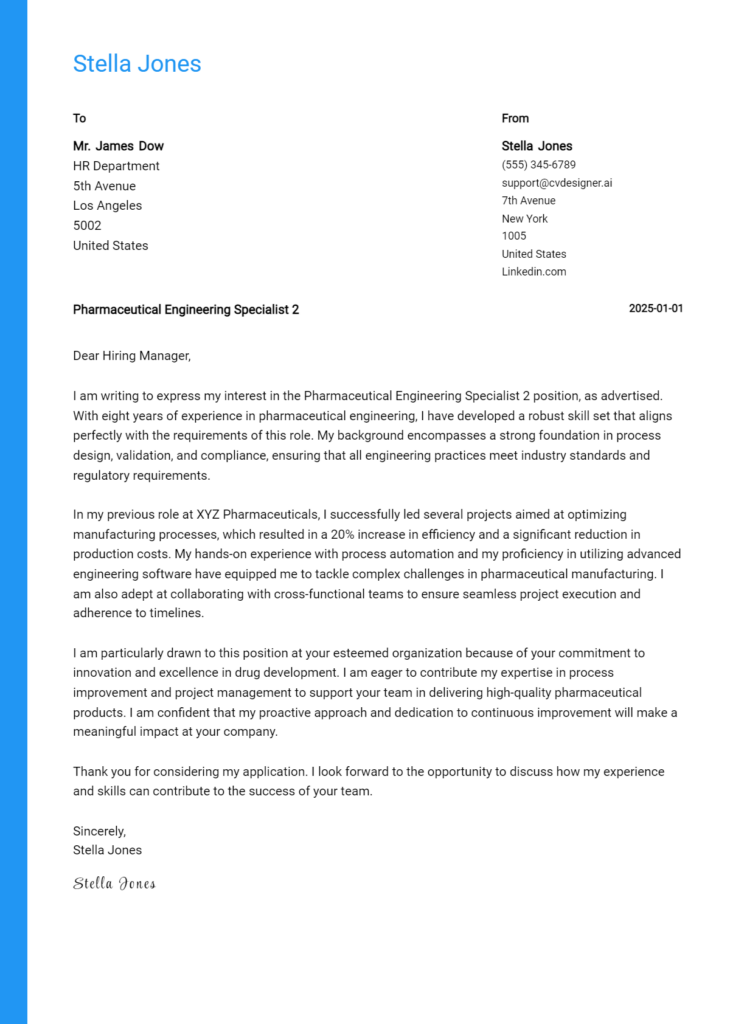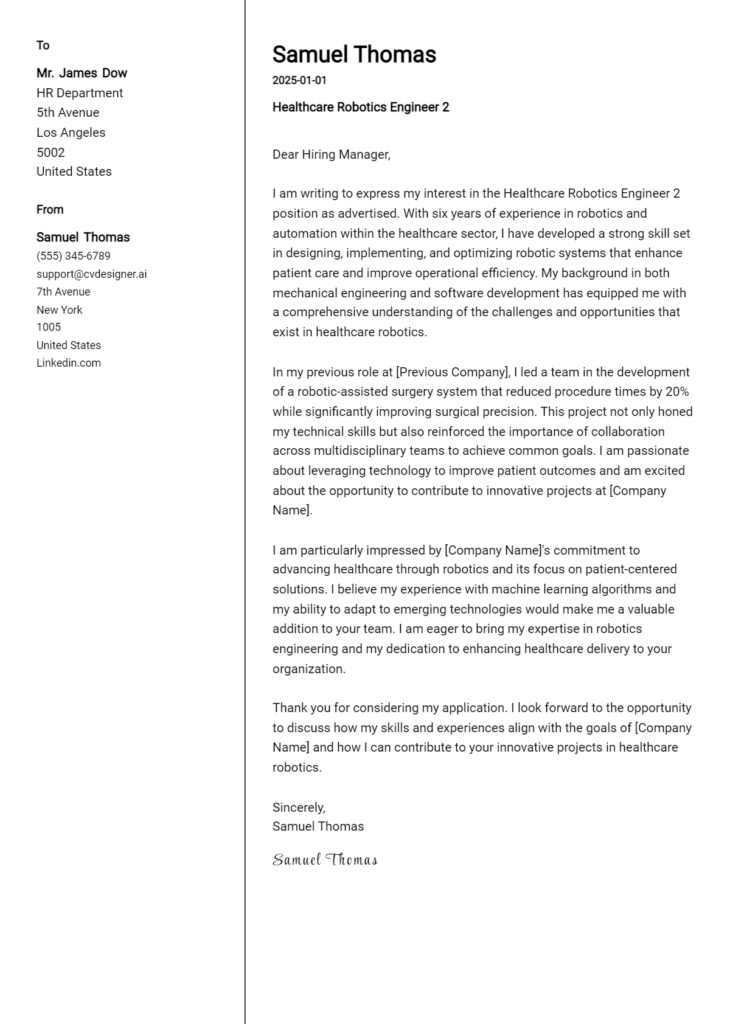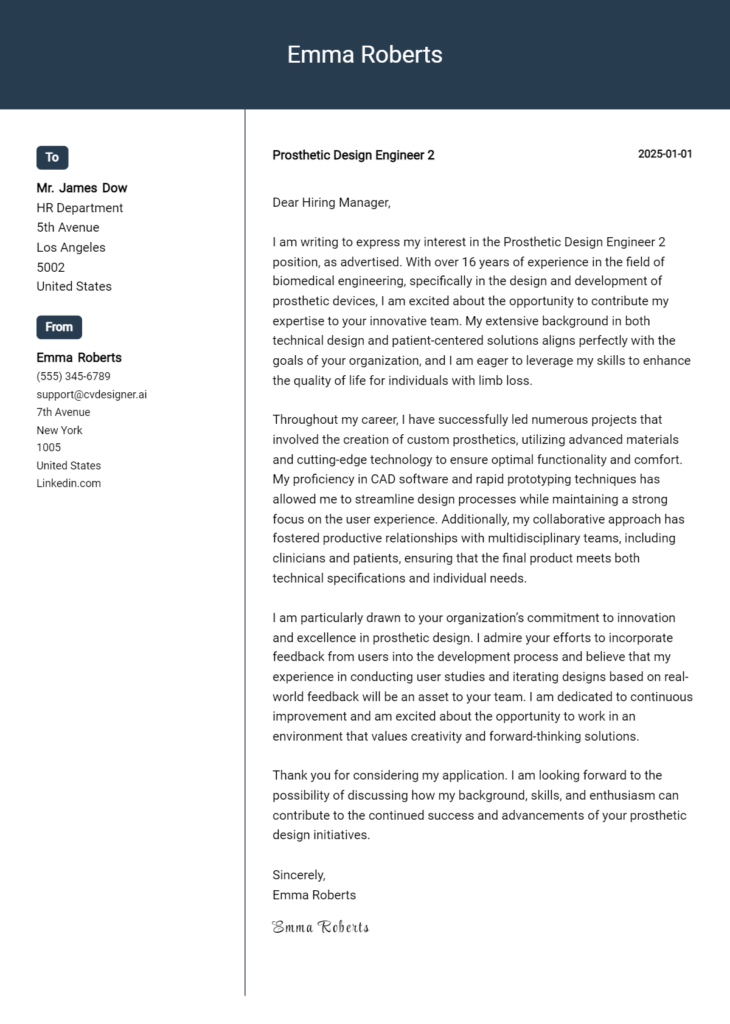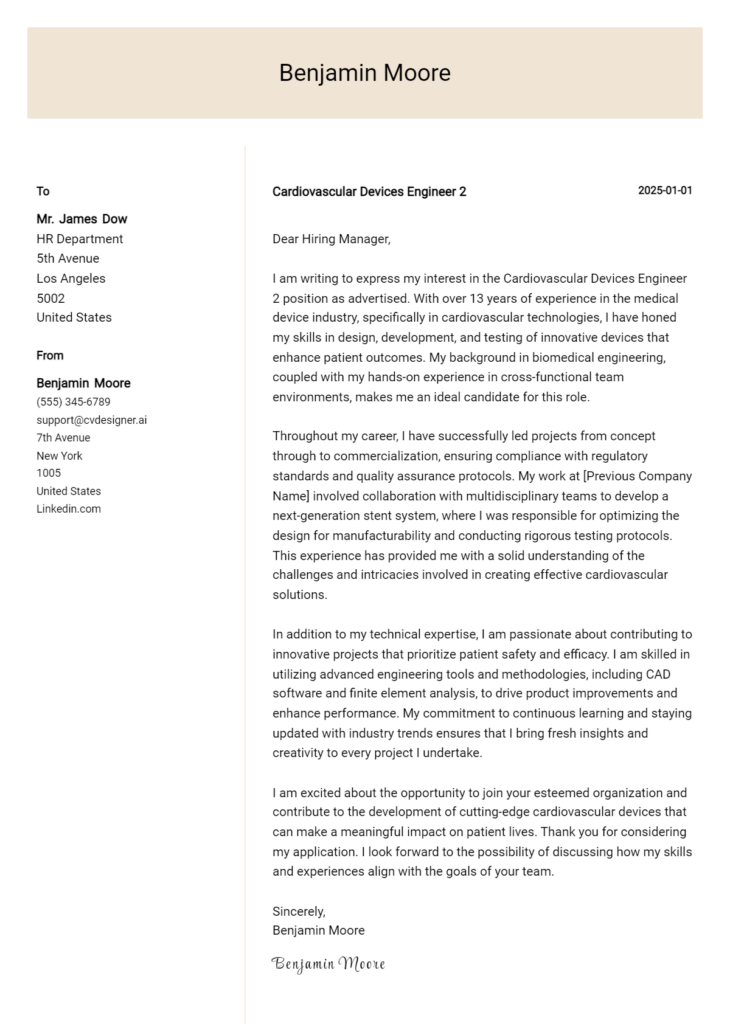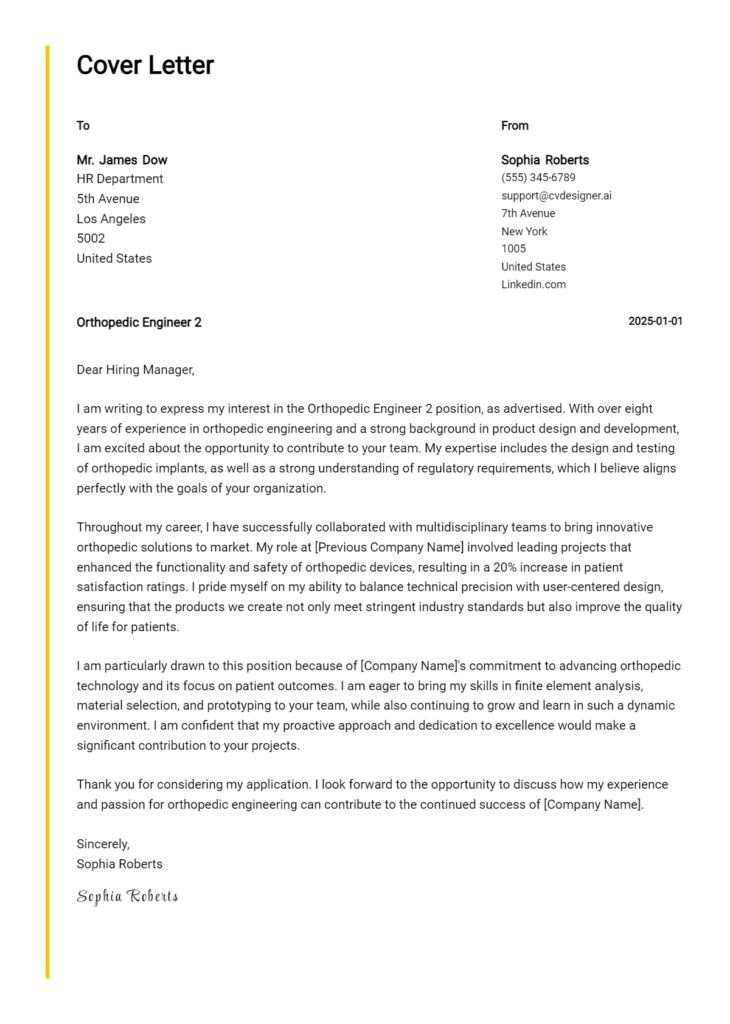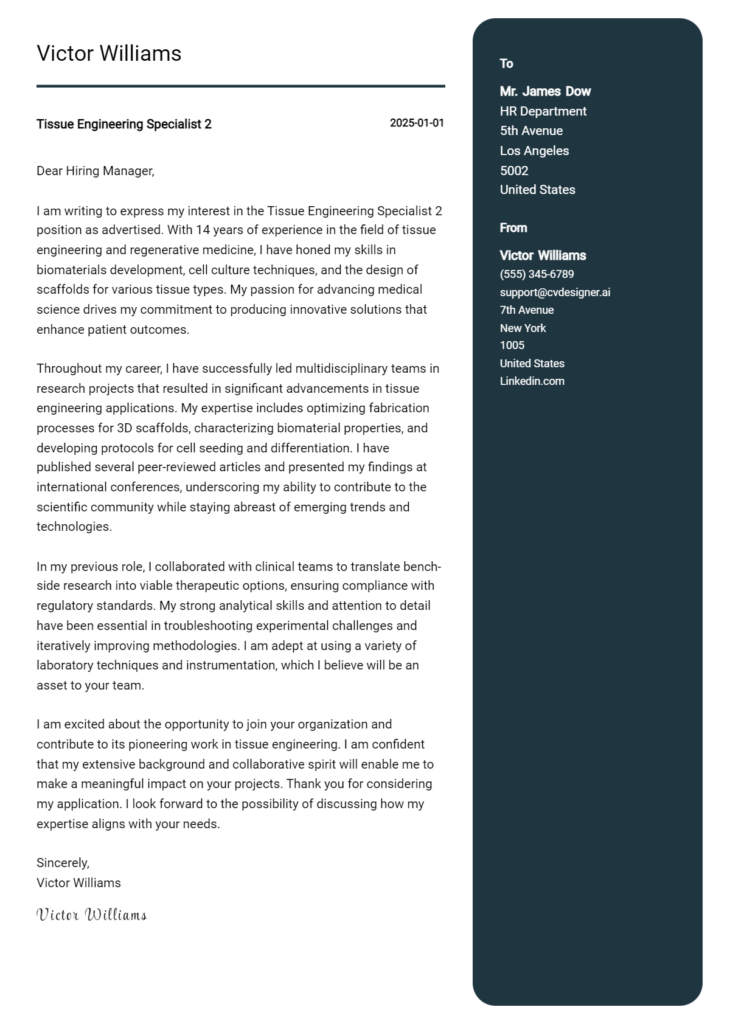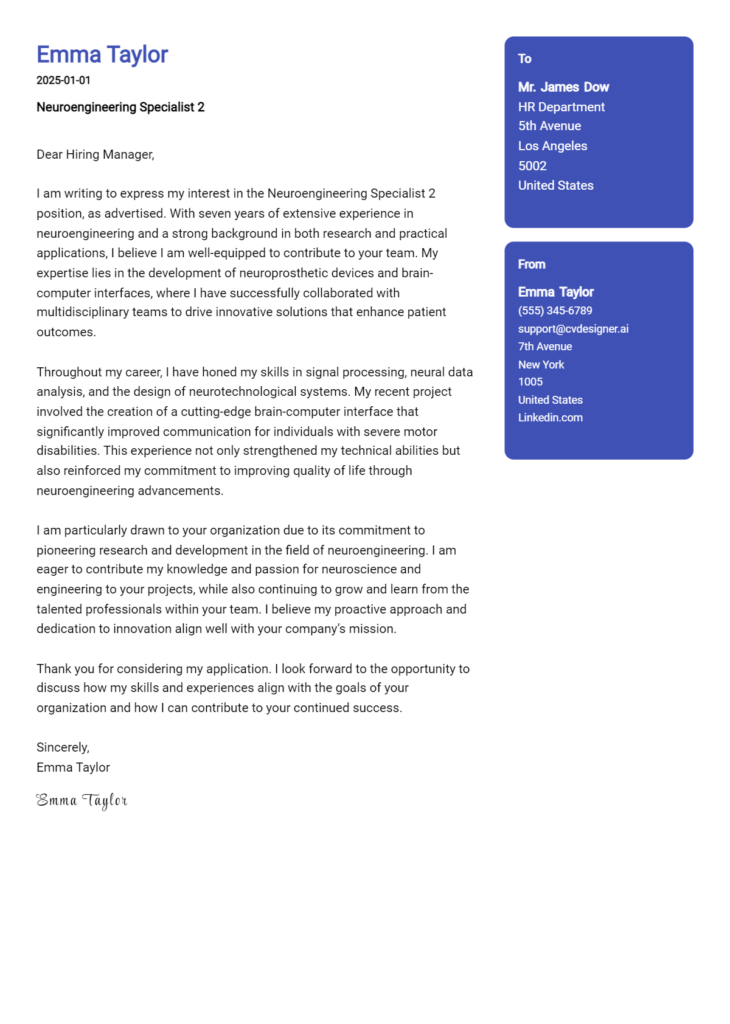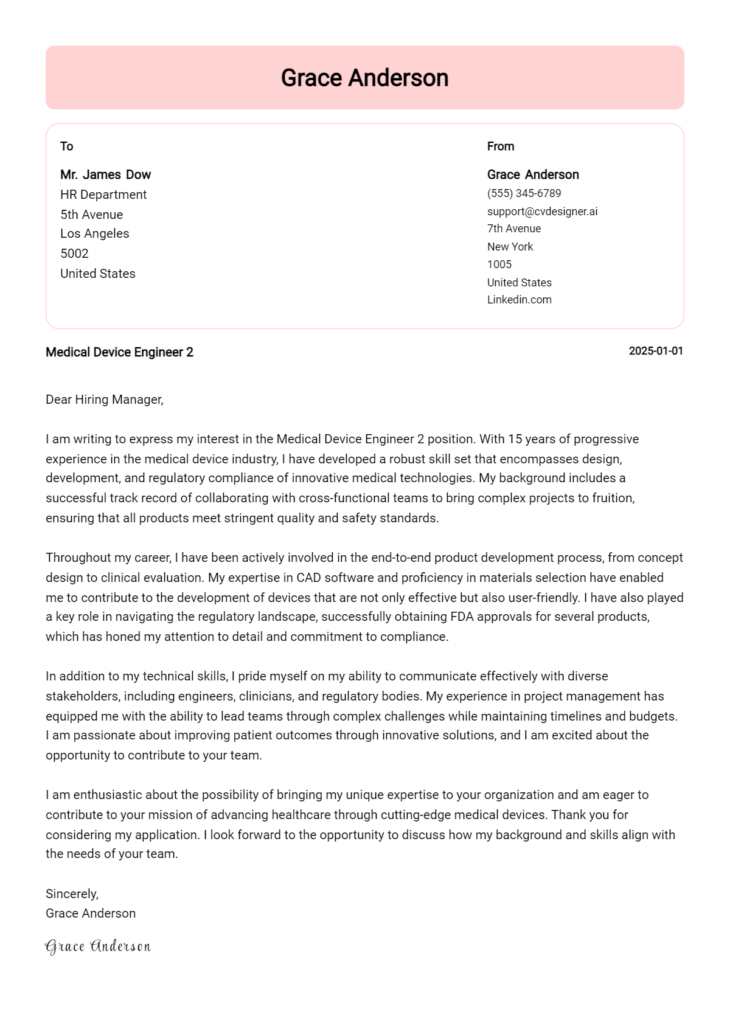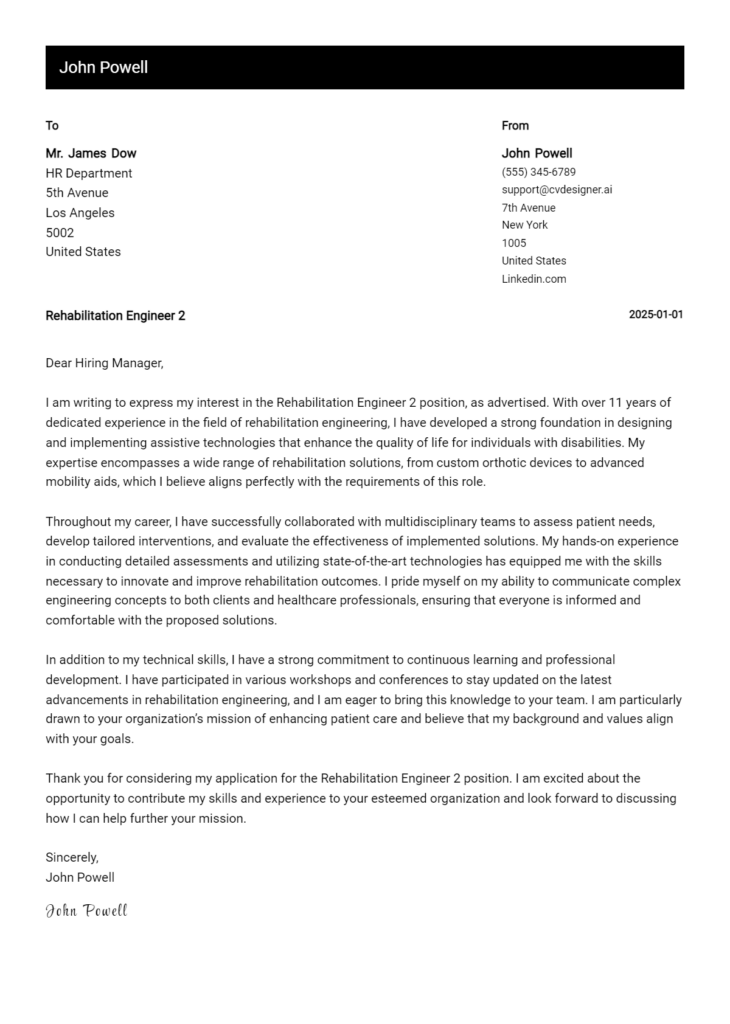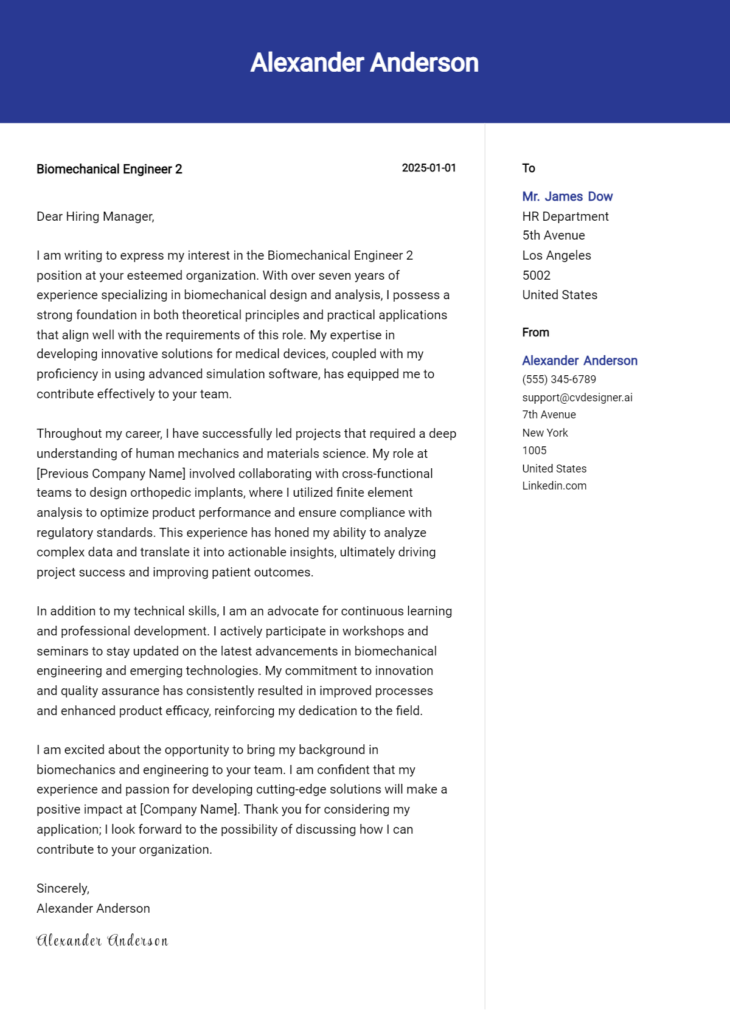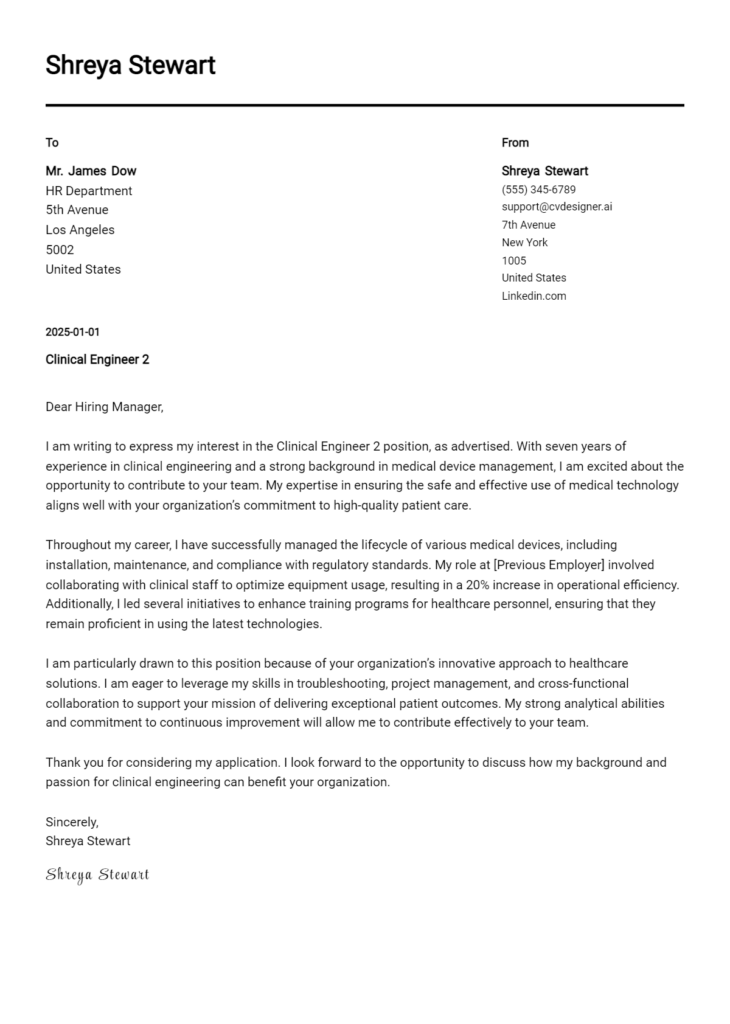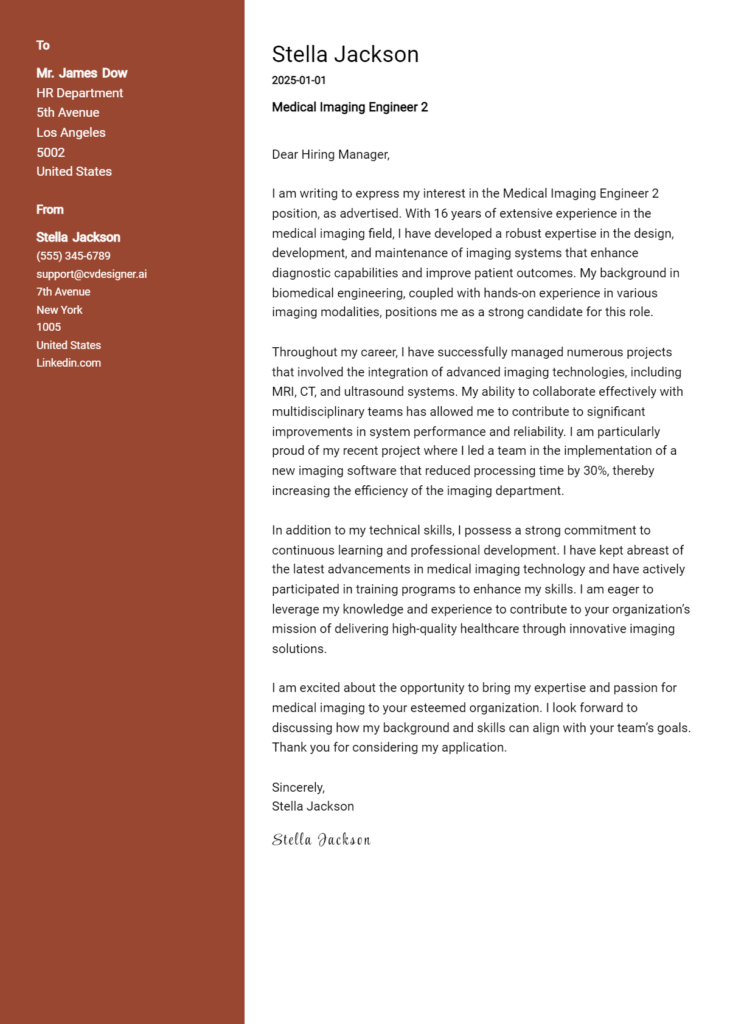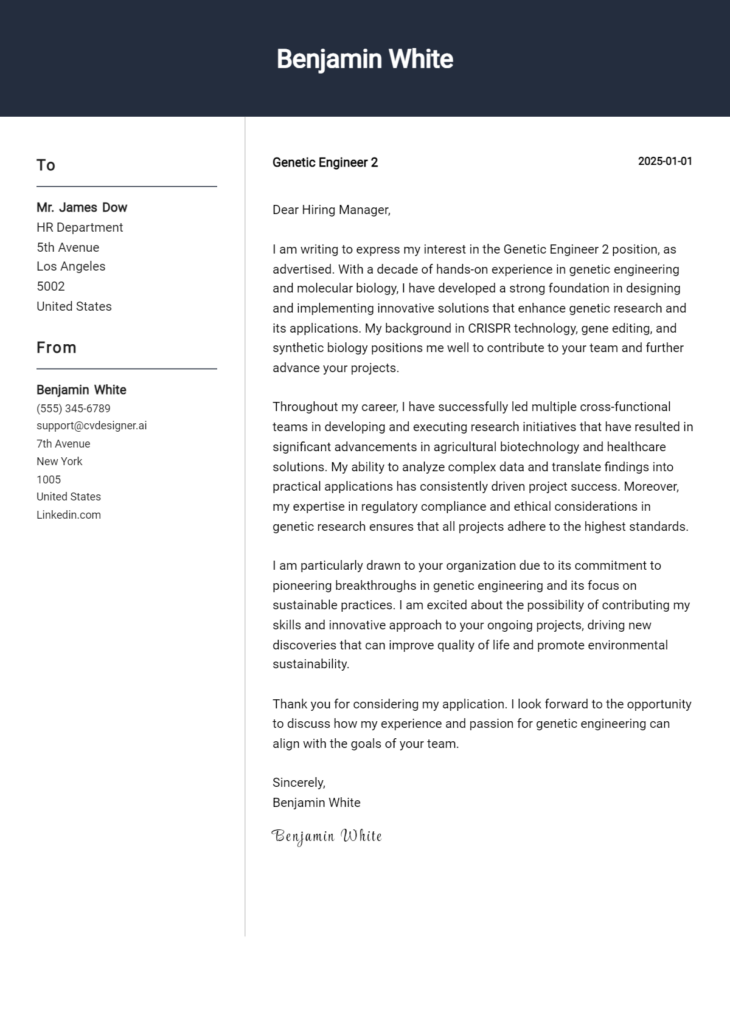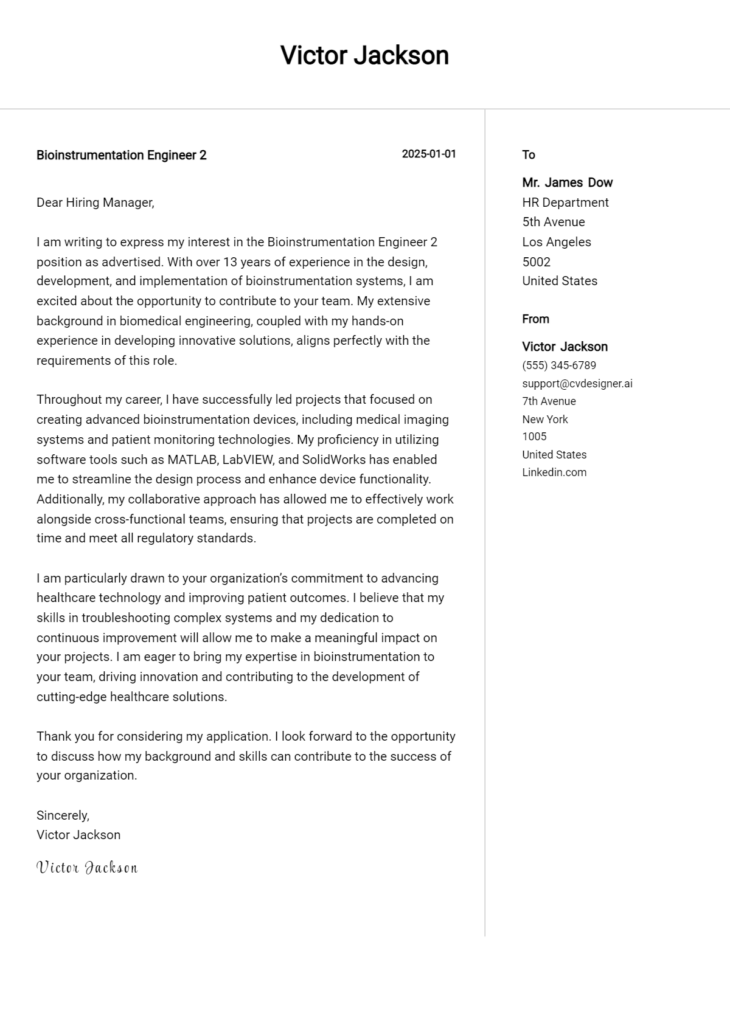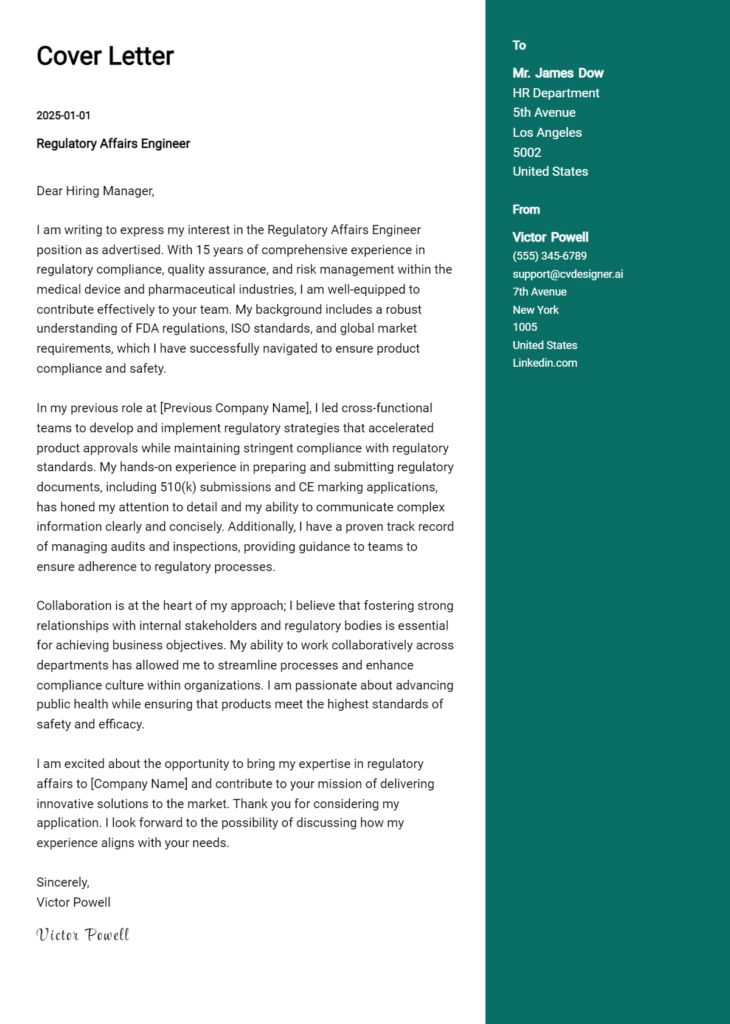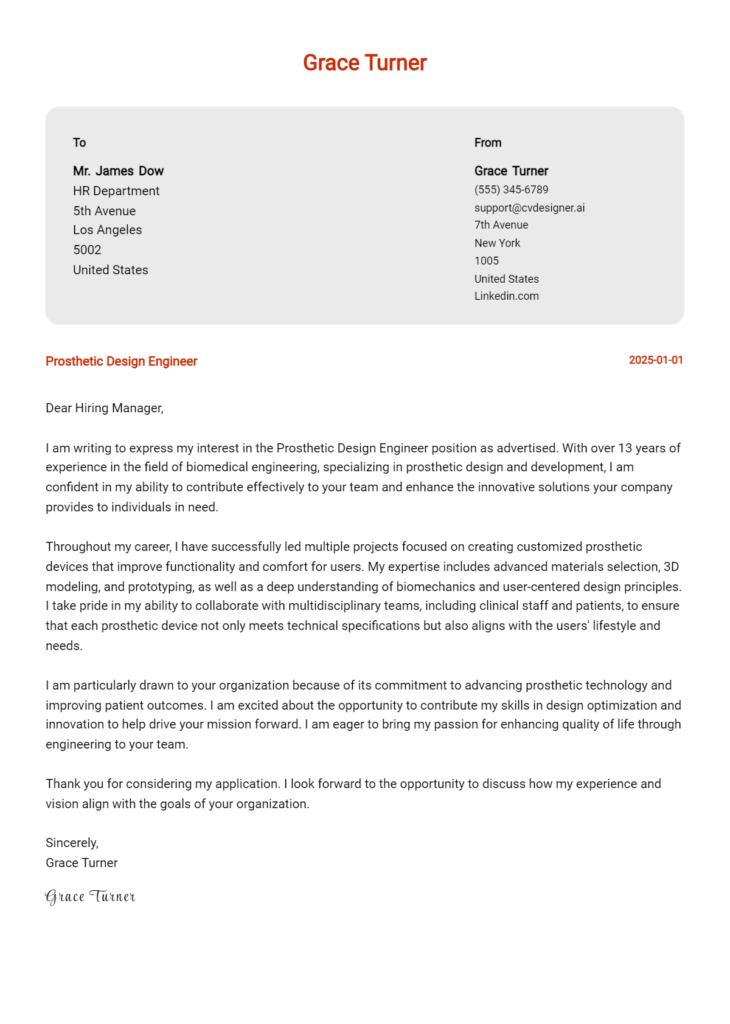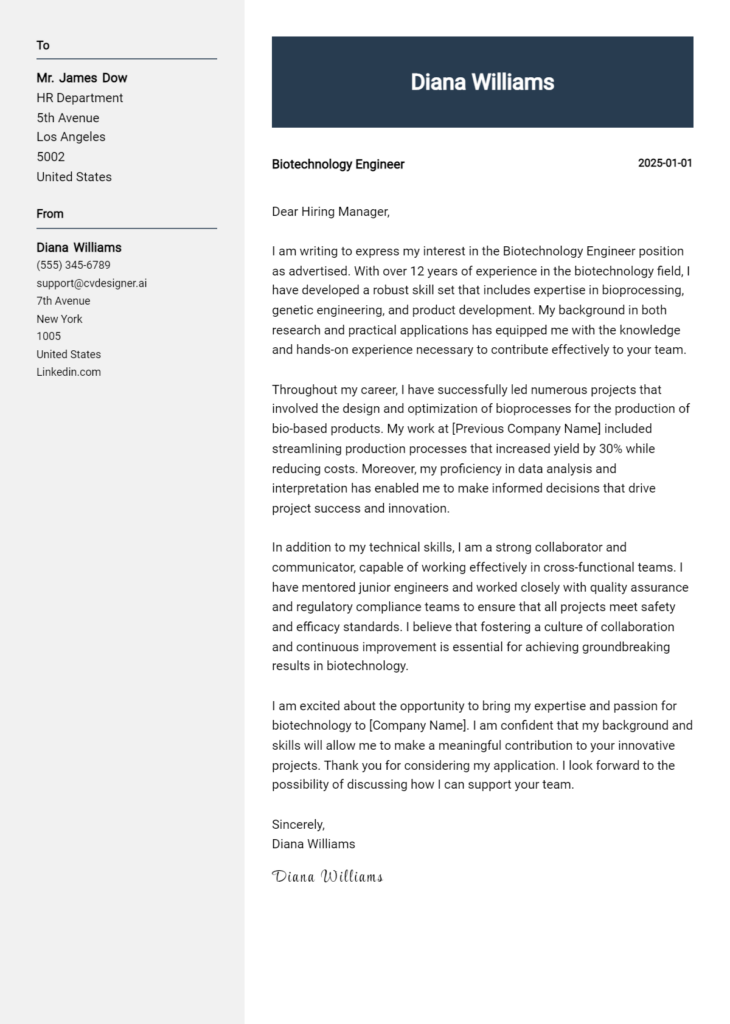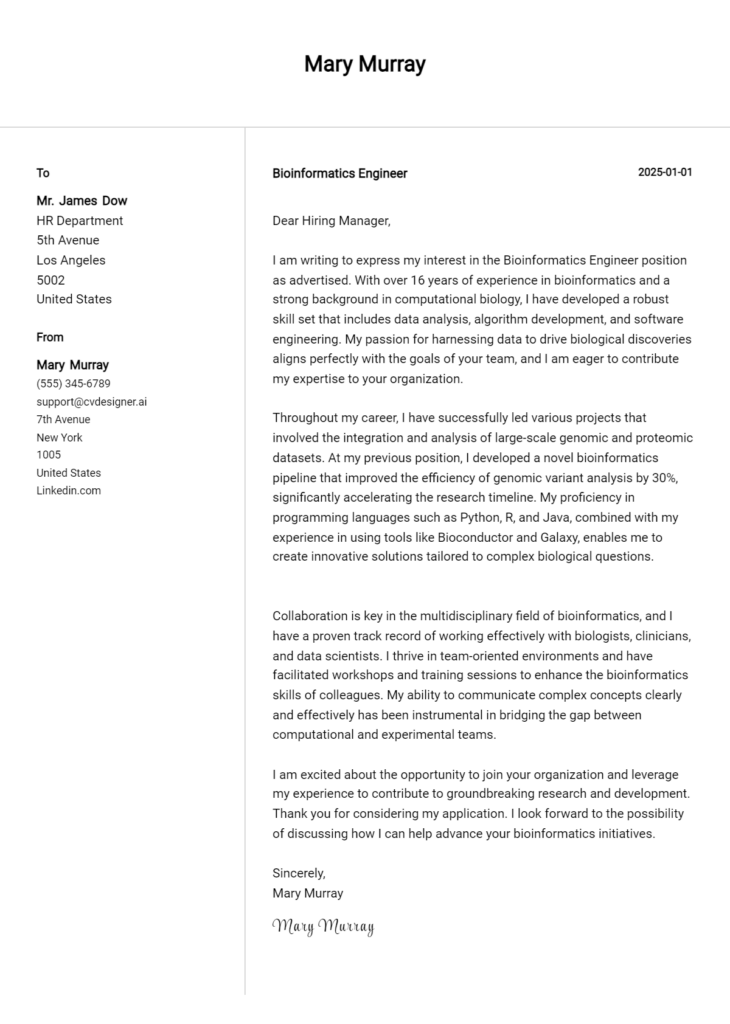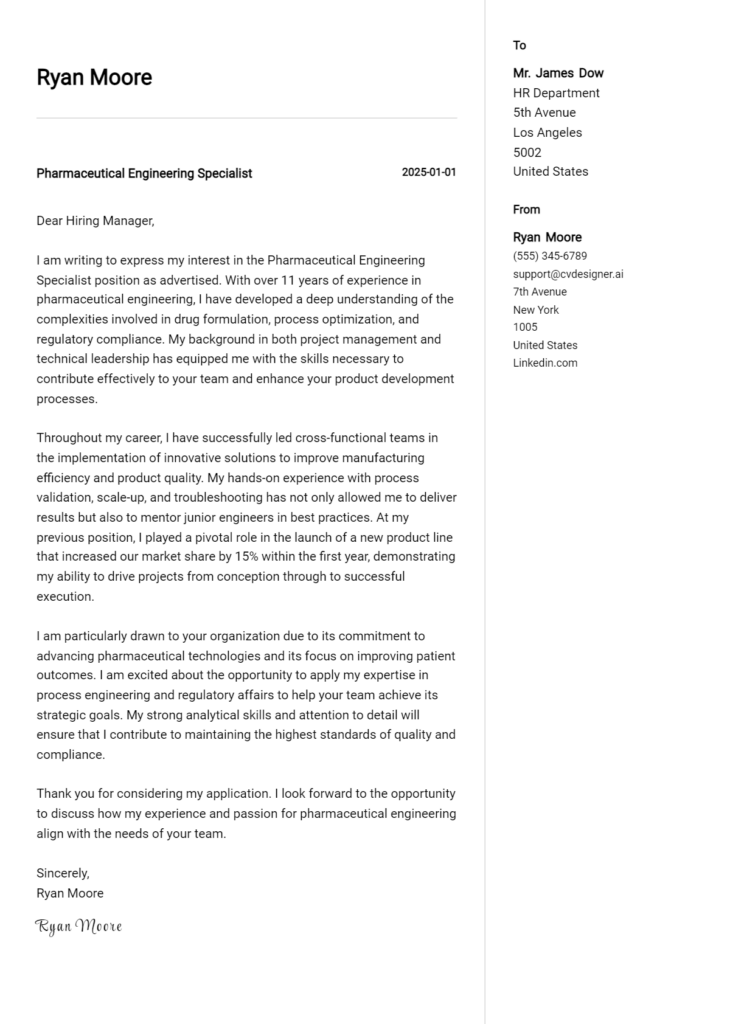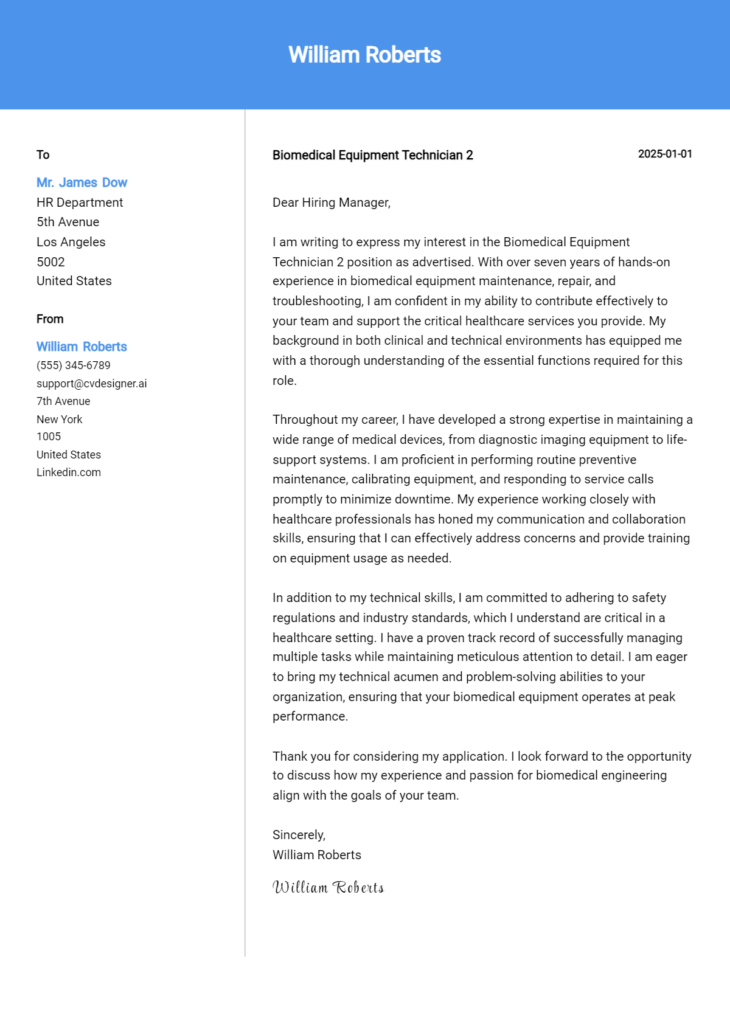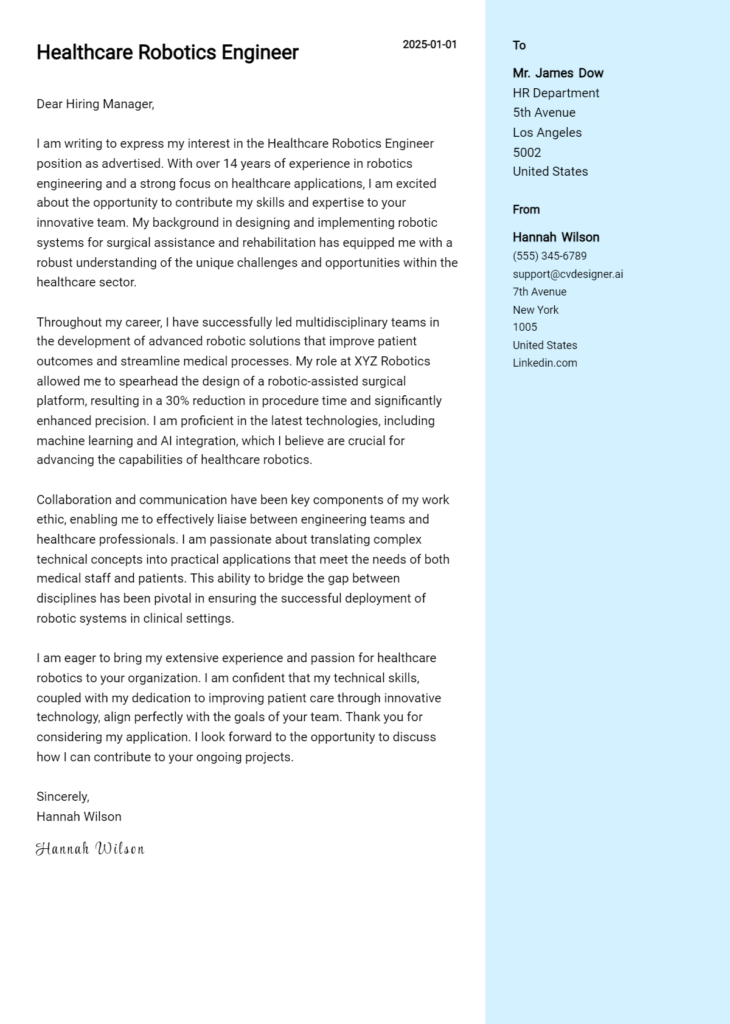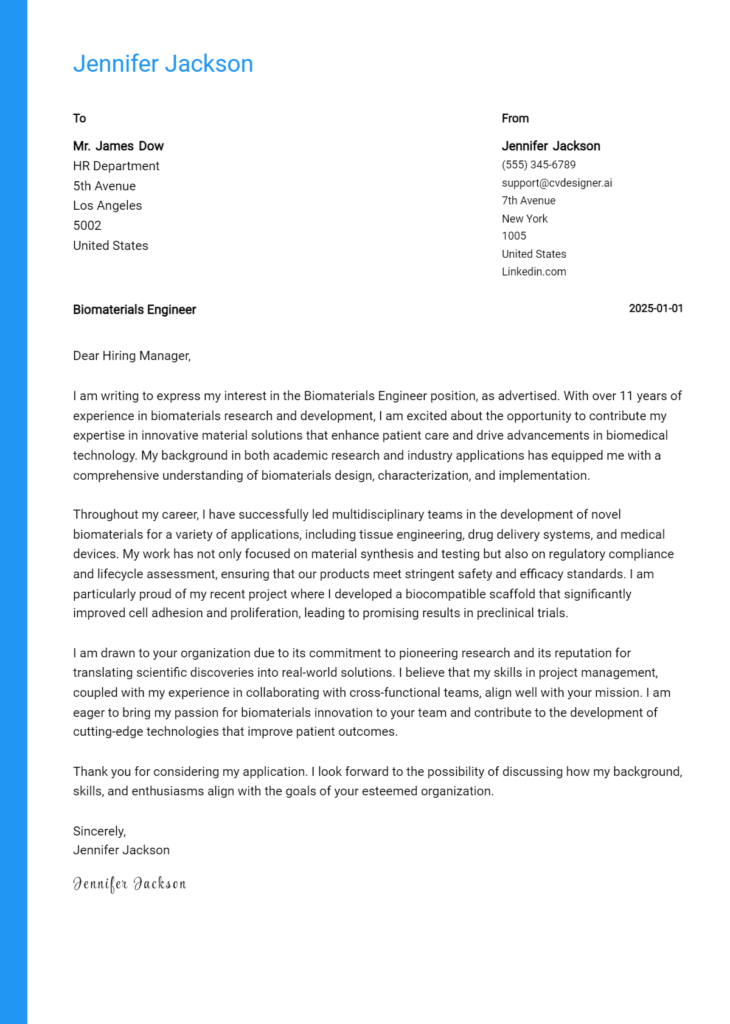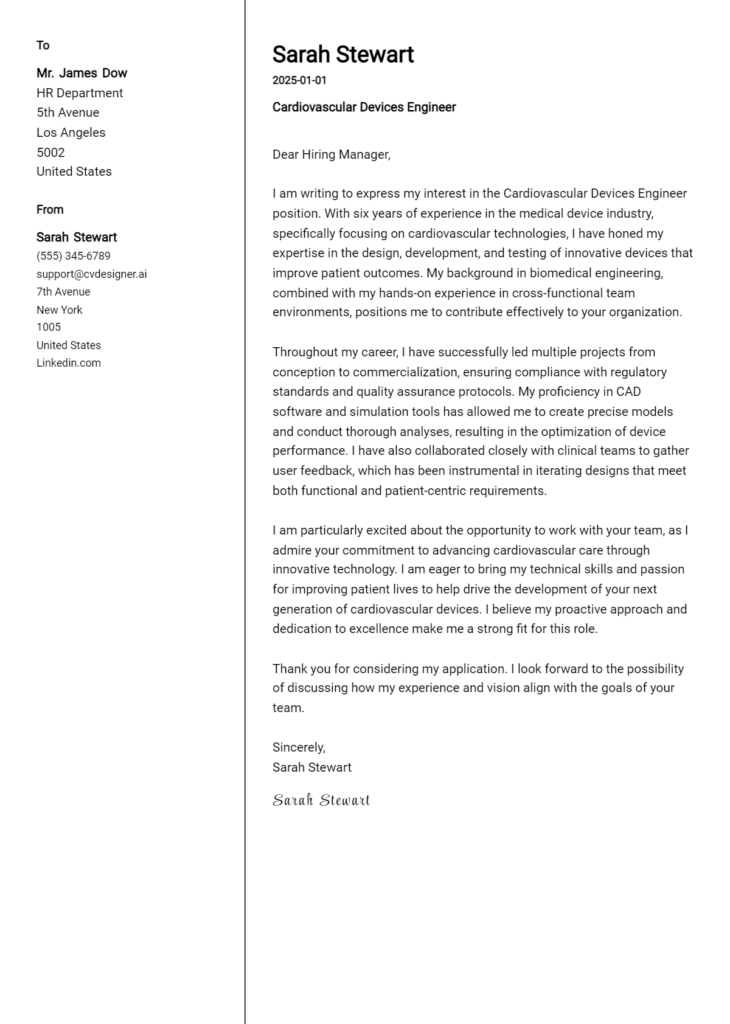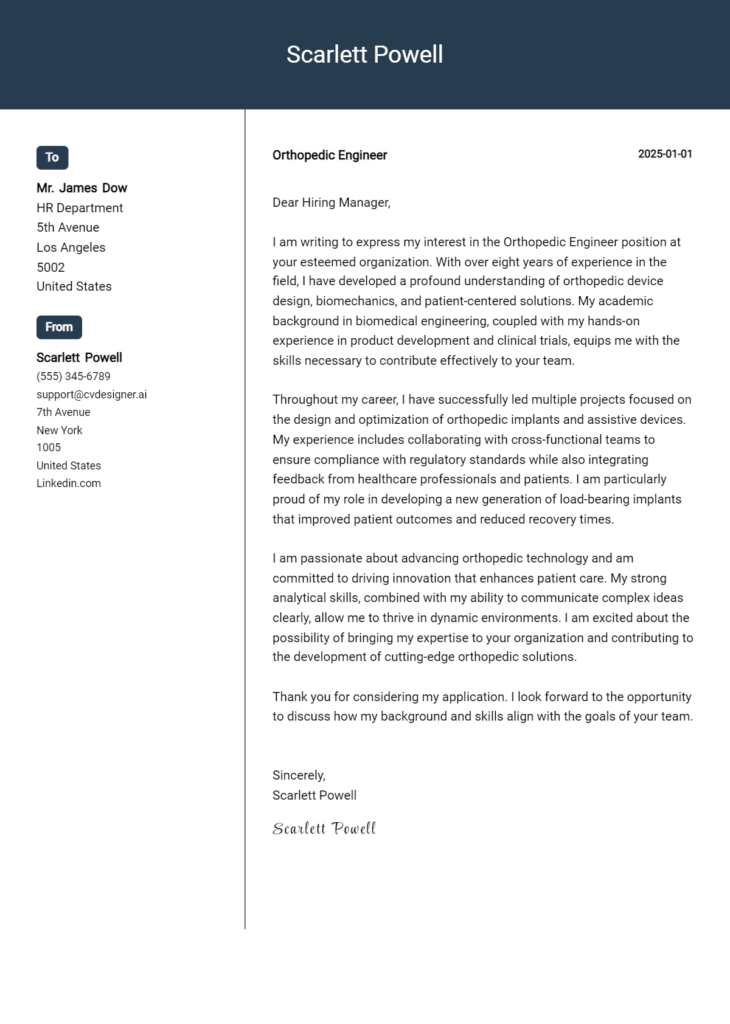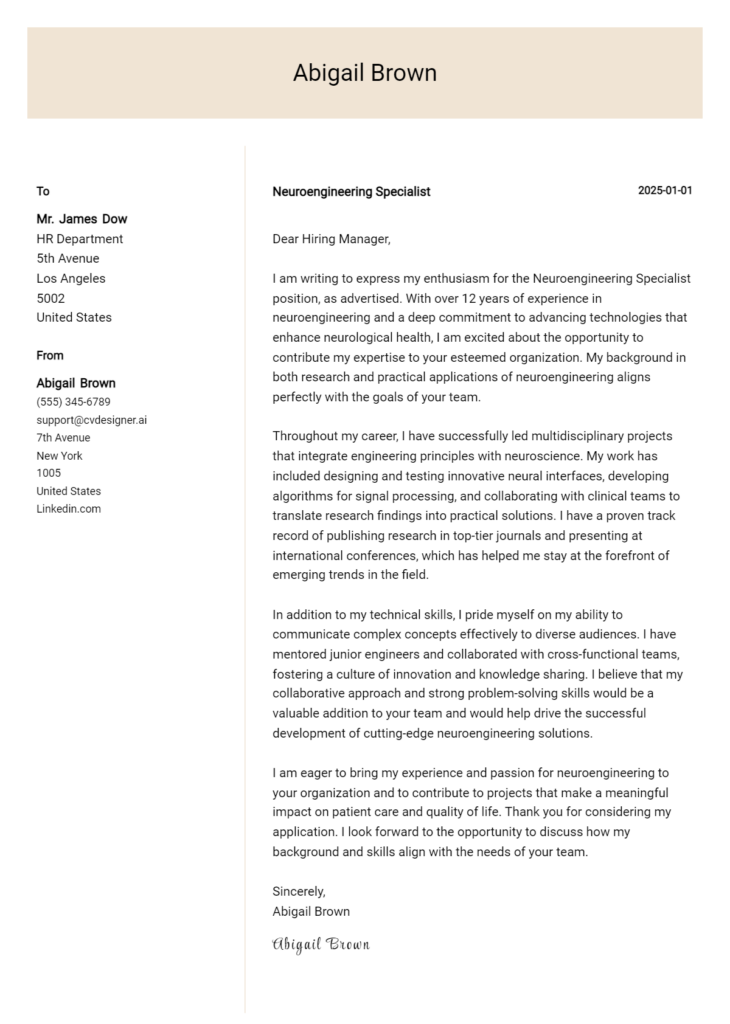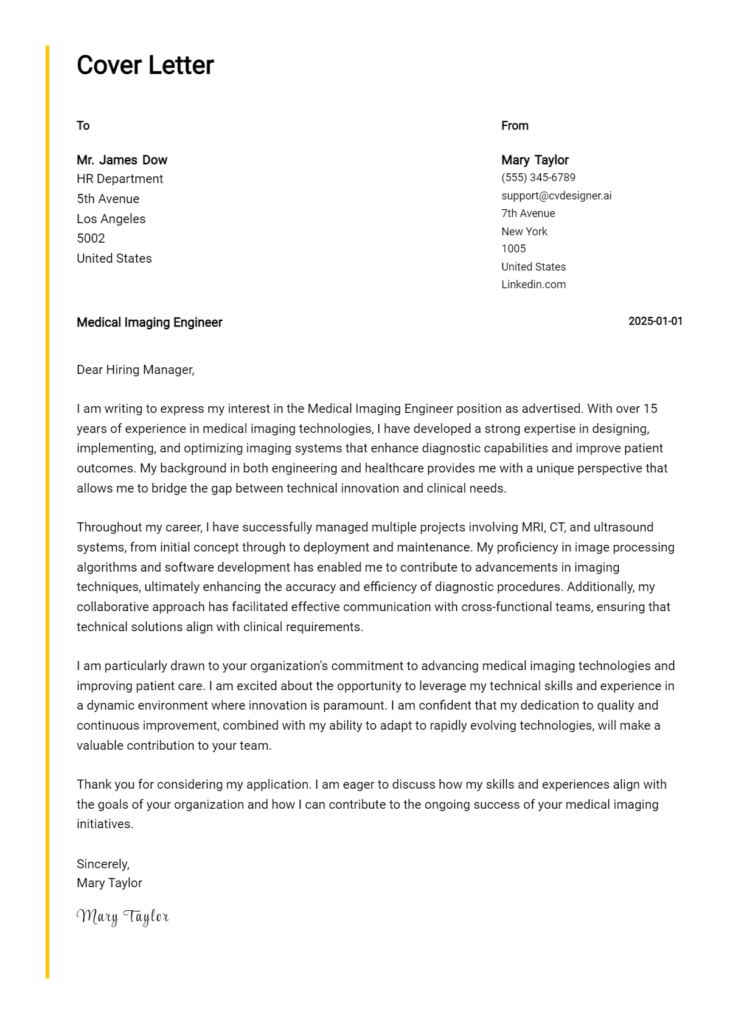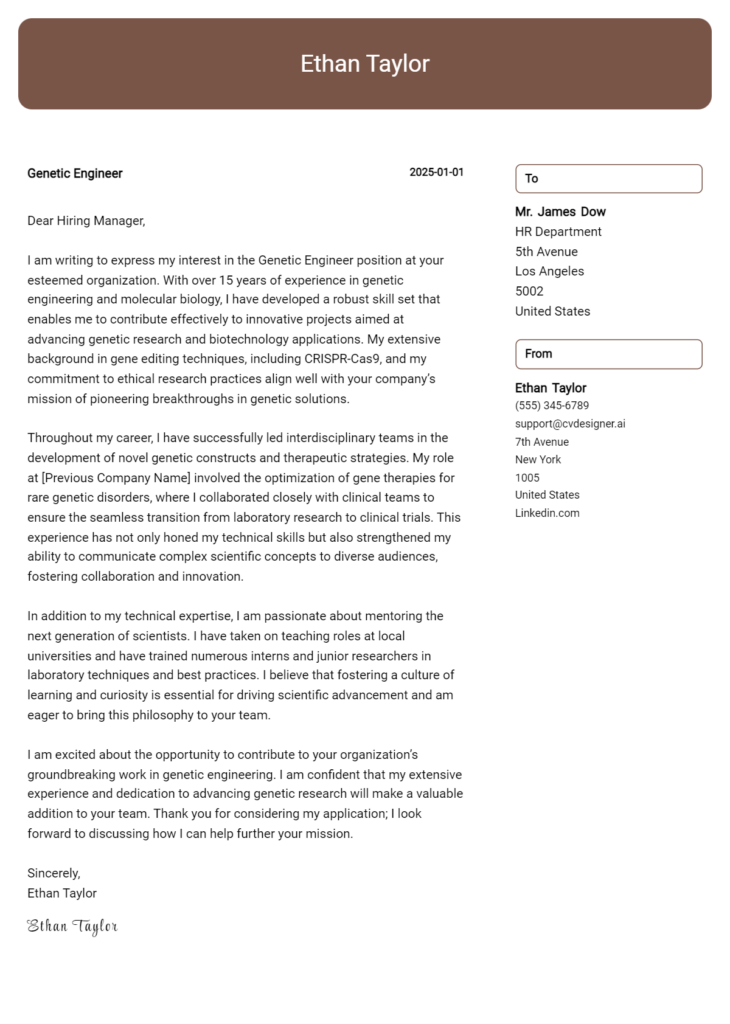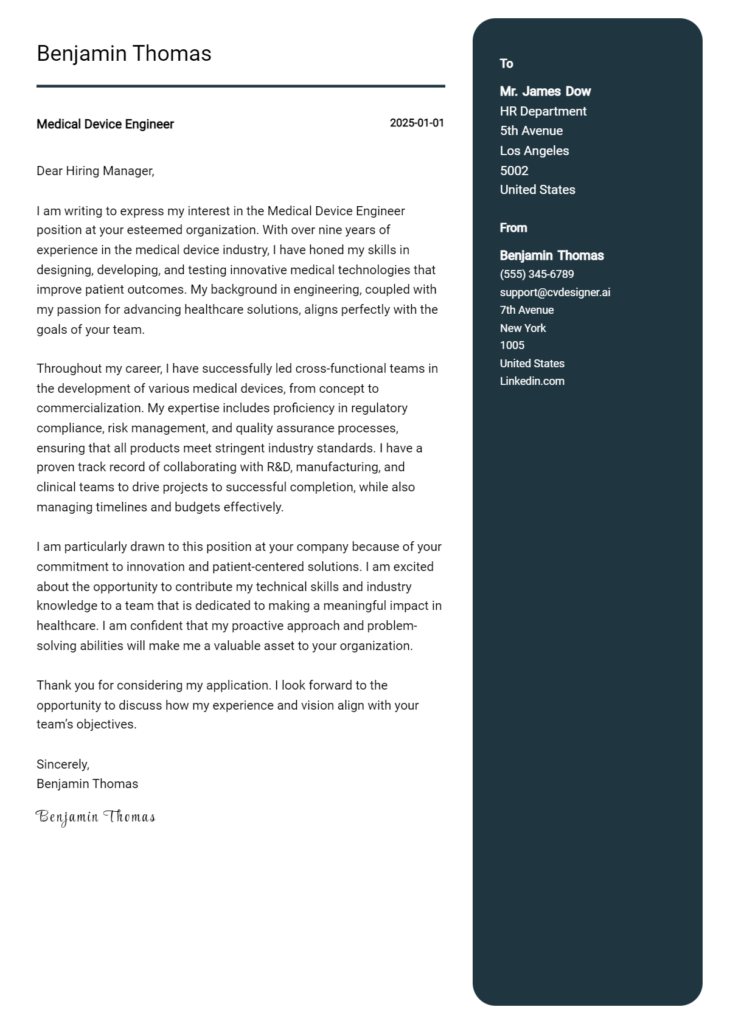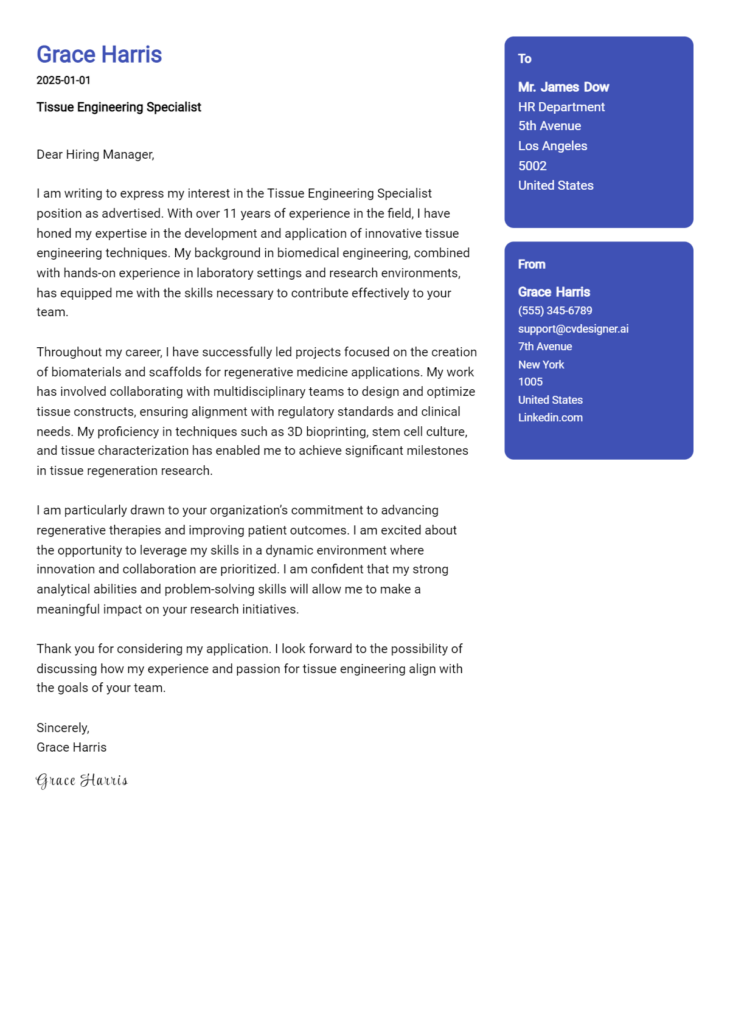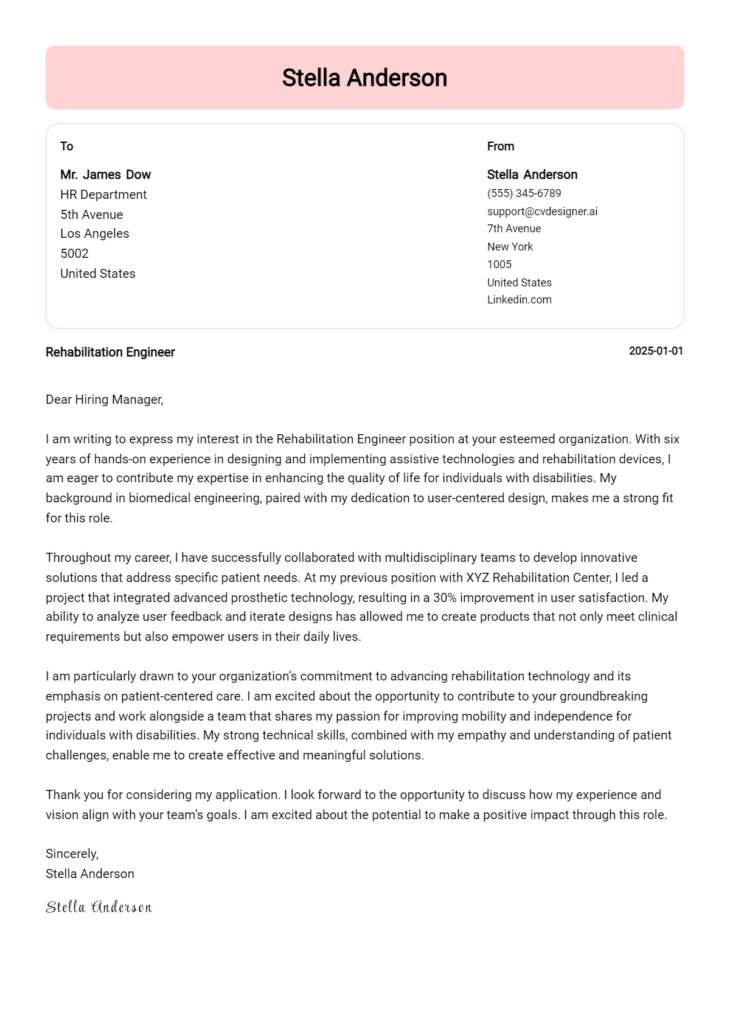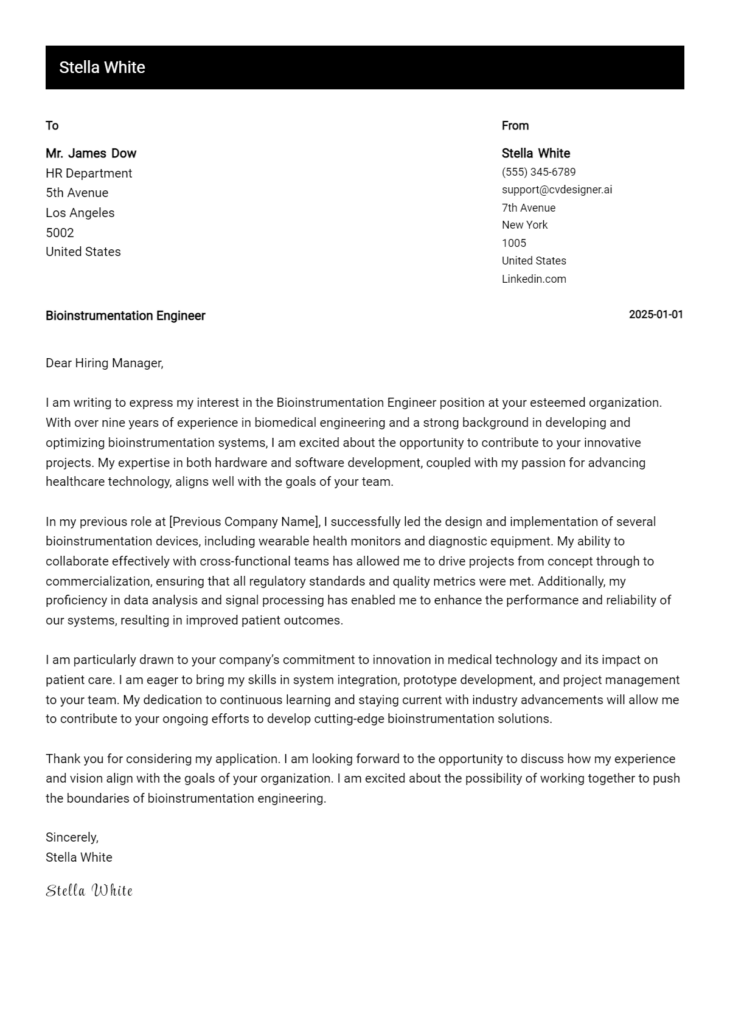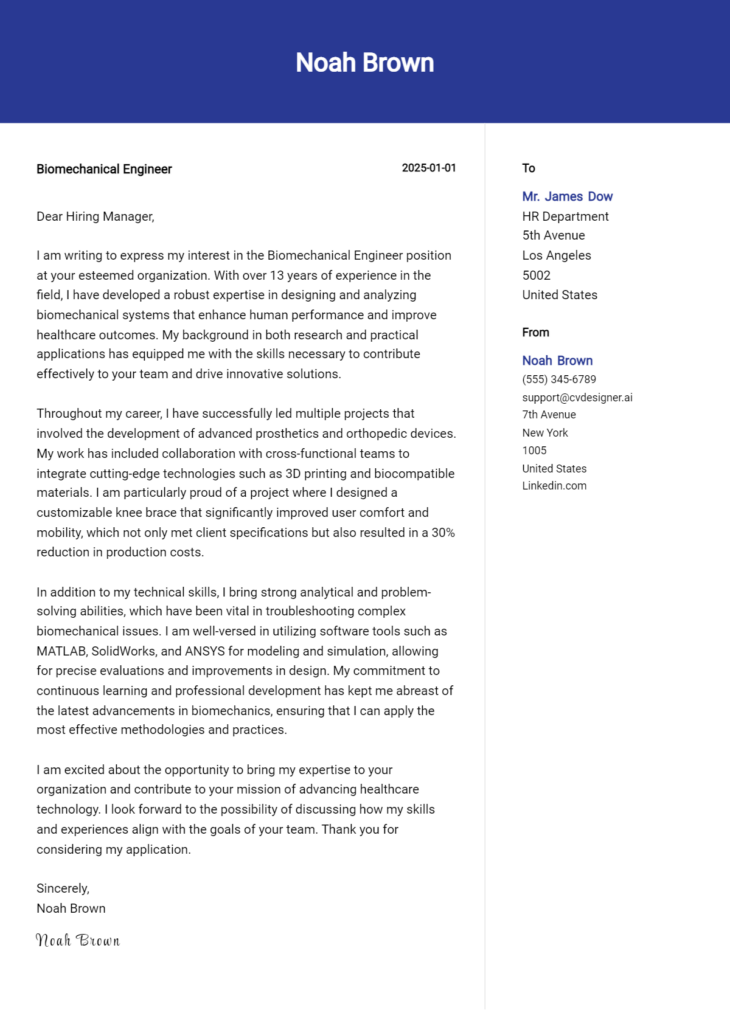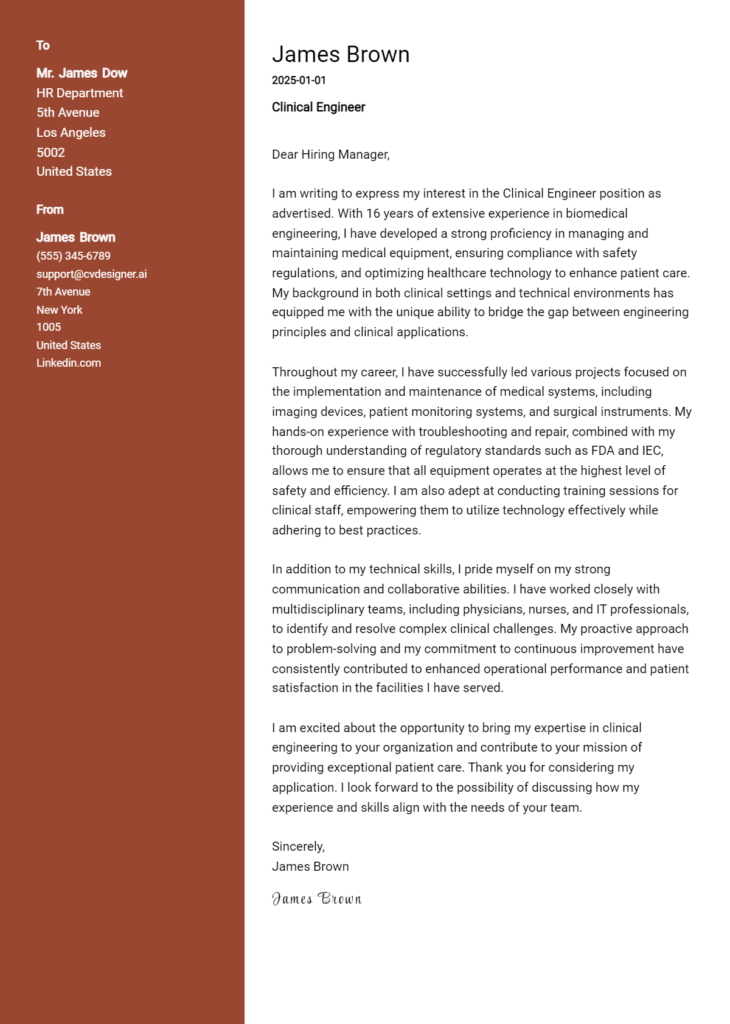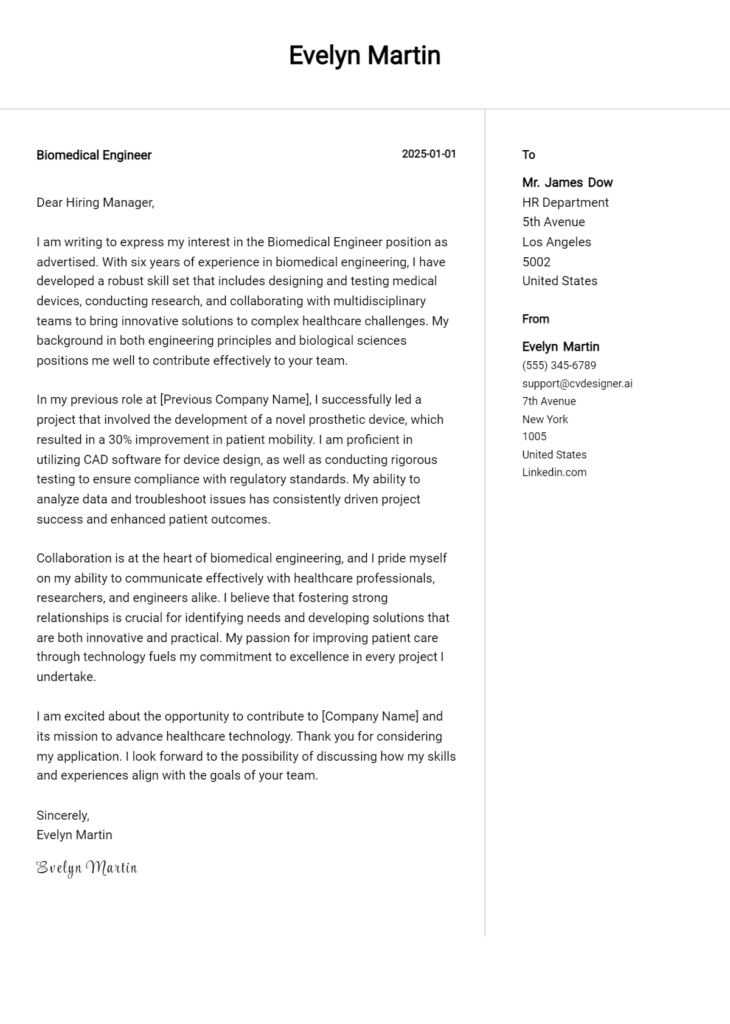Biomedical Engineer 2 Cover Letter Examples
Explore additional Biomedical Engineer 2 cover letter samples and guides and see what works for your level of experience or role.
How to Format a Biomedical Engineer Cover Letter?
Crafting a compelling cover letter is essential for Biomedical Engineers, as it serves as your first opportunity to showcase your technical skills and innovative thinking. The way you format your cover letter not only reflects your professionalism but also mirrors the meticulous nature required in biomedical engineering. A well-structured letter can effectively capture the attention of hiring managers, emphasizing your analytical abilities and commitment to quality—traits that are vital in this field.
In this guide, we will explore the key components of a professional cover letter, including:
- Cover Letter Header
- Cover Letter Greeting
- Cover Letter Introduction
- Cover Letter Body
- Cover Letter Closing
Each section is crucial in demonstrating your qualifications and attention to detail. Let’s delve into each part to help you create a standout cover letter that resonates with potential employers in the biomedical engineering sector.
Importance of the Cover Letter Header for a Biomedical Engineer
A well-crafted cover letter header is crucial for a Biomedical Engineer as it sets the tone for the entire document and reflects your professionalism. The header should include your contact information, the date, and the recipient's details, ensuring that the hiring manager can easily identify you and reach out for further communication. Clarity in this section is essential, as it demonstrates your attention to detail—an important quality in the biomedical engineering field.
When formatting your header, aim for a clean and organized layout that highlights your qualifications and readiness for the position. Below are examples of a strong and a weak cover letter header for a Biomedical Engineer.
Strong Example
John Doe 123 Main Street City, State, ZIP email@example.com (123) 456-7890 October 1, 2023 Hiring Manager ABC Biomedical Solutions 456 Industry Lane City, State, ZIP
Weak Example
john d. somewhere street nowhere jd@email.com 10/1/23 To Whom It May Concern,
Importance of the Cover Letter Greeting for a Biomedical Engineer
The greeting of your cover letter is crucial as it sets the tone for the entire document. A well-crafted greeting demonstrates your professionalism and attention to detail, showing the hiring manager that you are serious about the position. Personalizing your greeting by addressing the hiring manager directly can create a connection and make a positive first impression. To avoid sounding generic, take the time to research the recipient's name; this can often be found on the company website, LinkedIn, or through networking. A personalized greeting indicates that you have a genuine interest in the position and the company.
Strong Greeting Example
Dear Dr. Jane Smith,
Weak Greeting Example
To Whom It May Concern,
The Art of a Compelling Cover Letter Introduction for Biomedical Engineers
A well-crafted cover letter introduction is crucial for a Biomedical Engineer, as it serves as the first impression to the hiring manager. This opening paragraph should not only grab attention but also convey genuine enthusiasm for the role. It is an opportunity for the candidate to briefly highlight key skills or achievements that align with the job requirements, setting the tone for the rest of the letter. A strong introduction can differentiate a candidate in a competitive job market, while a weak one may lead to missed opportunities.
Strong Example
Dear [Hiring Manager's Name], As a dedicated Biomedical Engineer with over five years of experience in designing innovative medical devices, I am excited to apply for the Biomedical Engineer position at [Company Name]. My passion for advancing healthcare technology, combined with my proven track record of successful project management and collaboration with cross-functional teams, positions me as an ideal candidate to contribute to your team and help drive the development of cutting-edge solutions that improve patient outcomes.
Weak Example
To Whom It May Concern, I am writing to apply for the Biomedical Engineer position. I have worked in biomedical engineering for a while and am interested in this job. I think I can do some of the tasks mentioned in the job description, and I have a degree in engineering.
Purpose of the Cover Letter Body for a Biomedical Engineer
The cover letter body serves as a crucial component in a Biomedical Engineer's application, allowing candidates to effectively communicate their unique skills, experiences, and the value they can bring to the company. By detailing specific projects and accomplishments, the candidate can illustrate their technical expertise and problem-solving abilities, as well as their capacity for innovation in the field. This section provides an opportunity to connect past experiences with the specific needs and goals of the company, thereby demonstrating a strong fit for the role.
Strong Example
Dear Hiring Manager, I am excited to apply for the Biomedical Engineer position at [Company Name]. In my previous role at [Previous Company], I led a team to develop a novel prosthetic limb that improved functionality by 30% compared to existing models. This project not only enhanced my skills in CAD software and materials science but also deepened my understanding of user-centered design principles. Additionally, I collaborated with healthcare professionals to conduct user testing, which resulted in a significant increase in patient satisfaction. I am eager to bring my passion for innovation and my proven track record in biomedical solutions to [Company Name].
Weak Example
Dear Hiring Manager, I am applying for the Biomedical Engineer position at [Company Name]. I have a degree in Biomedical Engineering and some experience working on projects. I think I would be a good fit for the job. I have worked on a few assignments during my studies, but I can't remember the details. I am really interested in working at [Company Name] because it seems like a good place to work.
Importance of Cover Letter Closing for a Biomedical Engineer
The closing of a cover letter is a crucial section that leaves a lasting impression on potential employers. For a Biomedical Engineer, it's important to summarize your qualifications, reiterate your enthusiasm for the position, and encourage the next steps, such as reviewing your resume or scheduling an interview. A strong closing can reinforce your suitability for the role and prompt action from the hiring manager, while a weak closing may diminish the overall impact of your application.
Strong Example
Thank you for considering my application for the Biomedical Engineer position at [Company Name]. I am excited about the opportunity to contribute my expertise in medical device design and my passion for improving patient outcomes. I believe my experience in both research and practical applications aligns well with the needs of your team. I look forward to the opportunity to discuss how my skills can benefit [Company Name] and am eager to provide more insights into my qualifications during an interview. Please feel free to review my resume for further details on my background.
Weak Example
Thanks for reading my letter. I think I would be a good fit for the job. If you want to talk, that would be fine. You can look at my resume if you want.
Crafting a compelling cover letter is essential for Biomedical Engineer candidates looking to stand out in a competitive job market. A well-structured cover letter allows you to showcase your technical skills, problem-solving abilities, knowledge of the Software Development Life Cycle (SDLC), teamwork experience, and passion for continuous learning. Here are some tips to help you create an effective cover letter that highlights your qualifications and makes a strong impression.
Tips for Writing a Biomedical Engineer Cover Letter
Highlight Technical Skills
Begin your cover letter by emphasizing your technical skills relevant to biomedical engineering. Mention specific tools, software, and technologies that you are proficient in, such as CAD software, MATLAB, or any relevant medical device technologies. Be specific about how these skills align with the job requirements, as this demonstrates your understanding of the role and your capability to perform the necessary tasks effectively.Demonstrate Problem-Solving Abilities
Biomedical engineering often involves addressing complex problems. Use real-life examples to illustrate your problem-solving skills. Describe a challenging project or situation where you applied your analytical thinking to find a solution. This not only showcases your ability to tackle issues but also highlights your resourcefulness and creativity.Showcase Knowledge of SDLC
If the position involves software development or systems integration, it's essential to demonstrate your knowledge of the Software Development Life Cycle (SDLC). Briefly explain your experience with different phases of the SDLC and how you have contributed to projects in each phase. This shows employers that you are well-versed in the processes that drive successful project outcomes.Emphasize Teamwork and Collaboration
Biomedical engineering often requires working in multi-disciplinary teams. Highlight your teamwork experience by discussing specific projects where you collaborated with others, including engineers, healthcare professionals, or researchers. Mention your role in these projects and how you contributed to achieving common goals, showcasing your ability to work well with diverse groups.Express a Passion for Continuous Learning
The field of biomedical engineering is constantly evolving, making continuous learning vital. Share your enthusiasm for keeping up with industry trends, new technologies, and ongoing education. Mention any relevant coursework, certifications, or training you have pursued. This demonstrates your commitment to professional development and your readiness to adapt to new challenges.
By following these tips, you can craft a strong cover letter that effectively communicates your qualifications as a Biomedical Engineer. For additional guidance, consider exploring cover letter templates or using a cover letter builder to streamline the process.
Common Mistakes to Avoid in a Biomedical Engineer Cover Letter
Crafting a compelling cover letter is essential for standing out in the competitive field of biomedical engineering. Avoiding common mistakes can significantly enhance your chances of making a positive impression. Here are several pitfalls to watch out for:
Generic Content: Using a one-size-fits-all approach can make your cover letter forgettable. Tailor your letter to the specific job and company. Research the organization to reflect their values and goals.
Ignoring Formatting Guidelines: A poorly formatted cover letter can detract from your qualifications. Adhering to a professional cover letter format ensures clarity and readability.
Focusing on Duties Instead of Achievements: Instead of listing job responsibilities, highlight your accomplishments. Use specific examples that demonstrate your impact in previous roles.
Neglecting to Show Passion: Biomedical engineering is a field driven by innovation and dedication. Convey your enthusiasm for the industry and the specific position to make your application more engaging.
Spelling and Grammar Errors: Typos can undermine your professionalism. Always proofread your letter or use tools to check for errors before submission.
Being Too Lengthy: A cover letter should be concise and to the point. Aim for a single page and ensure every sentence adds value to your application.
Failing to Include a Call to Action: Conclude your letter on a strong note by expressing your desire for an interview and how you can contribute to the company’s success.
By steering clear of these common mistakes and utilizing resources like cover letter examples, you can create a compelling narrative that showcases your qualifications and passion for biomedical engineering.
Cover Letter FAQs for Biomedical Engineer
What should I include in my biomedical engineer cover letter?
In your cover letter for a biomedical engineering position, start with a strong introduction that grabs attention and states the position you’re applying for. Include your educational background, especially if you have a degree in biomedical engineering or a related field. Highlight relevant skills, such as proficiency in CAD software, knowledge of regulatory standards, and experience with medical device design. Incorporate any internships or projects that showcase your hands-on experience. Finally, express your enthusiasm for the role and the company, and conclude with a call to action, inviting the hiring manager to discuss your application further.
How can I tailor my cover letter for a specific job?
To tailor your cover letter, carefully read the job description and identify key skills and qualifications the employer seeks. Use specific examples from your background that align with these requirements. For instance, if the job emphasizes teamwork in project development, discuss your experience collaborating on a successful research project. Mention the company by name, and reference any projects or values that resonate with you. This personalized approach demonstrates your genuine interest in the role and shows that you’ve done your homework, making you a more compelling candidate.
Should I include technical skills in my cover letter?
Yes, including technical skills in your cover letter is essential for a biomedical engineer position. Highlight skills such as proficiency in software like MATLAB or SolidWorks, familiarity with FDA regulations, and expertise in biomaterials or tissue engineering. Be sure to provide context for these skills by mentioning specific projects or experiences where you applied them. This not only showcases your qualifications but also illustrates your ability to contribute effectively to the team. Remember to balance technical skills with soft skills like problem-solving, communication, and teamwork, as they are equally important in collaborative engineering environments.
How long should my cover letter be?
Your cover letter should ideally be one page long, consisting of three to four paragraphs. Aim for around 250 to 400 words, as this length allows you to convey your qualifications and enthusiasm without overwhelming the reader. Be concise and focused; each paragraph should serve a clear purpose—introduction, skills and experiences, alignment with the company's mission, and a closing statement. Use bullet points if necessary to highlight key achievements or skills, but ensure the overall format remains professional. A well-structured, succinct cover letter will make a stronger impression than one that is overly lengthy or verbose.
Build your Cover Letter in minutes
Use an AI-powered cover letter builder and have your letter done in 5 minutes. Just select your template and our software will guide you through the process.

